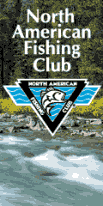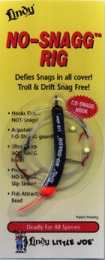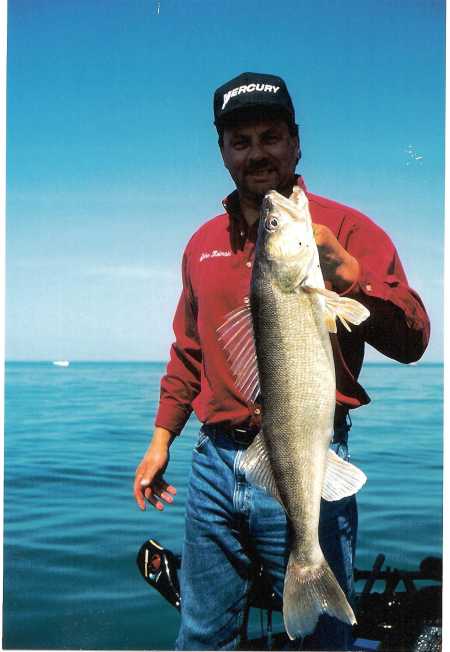 












Promotional
Team Favorites
Lodging food and more









|
Friends in Low Places
By JOHN KOLINSKI
Editor's note: John Kolinski is the Professional Walleye Trail's 2002
Angler
of the Year and a 12-time championship qualifier during eight years
as a pro
angler on the PWT, RCL and Masters Walleye Circuits. His articles can
be read in many Midwestern outdoor publications and at several web sites.
Kolinski is sponsored by Triton Boats, Mercury Motors, Lowrance Electronics,
Normark/Storm Lures, MinnKota, Lindy Legendary Tackle, Flambeau, Tempress
Rod Holders, Off-Shore Planer Boards, Berkley Trilene, Optima Batteries,
and Panther.
It's late summer, and with few exceptions, the easy walleye bites are
gone.
The spring run to spawning areas is ancient history. The postspawn
window
when walleyes spent much of their day gorging themselves in shallow
water has
closed. Early summer concentrations of fish on sand flats and along
shoreline
breaks have dissipated. Other biological factors are at work, too.
Light penetration and water clarity drive fish deep for most of the
day. So
do water temperature and the availability of desireable forage.
As the temperature increases in a body of water, so does a walleye's
need for
sustenance. But roaming the shallows and chasing three-inch minnows,
leeches
or crawdads expends energy which, in turn, requires more food. It's
a
never-ending circle.
It's far more efficient for predators to follow larger baitfish like
chubs,
smelt and alewifes into the deeper, cooler water they prefer. And that's
where
a well-placed live-bait rig can do some serious damage when other anglers
are
beating the shorelines to a froth or trolling aimlessly in search of
fish that
never seem to stay in one area for very long.
In many late-summer situations on reservoirs, natural lakes and major
river
systems, the largest walleyes probably spend no more than a few minutes
of an
average day on a major feeding reconnaissance mission. And it probably
occurs at times when the majority of anglers are dreaming about trophy
fish rather
than pursuing them. Instead, these fat, lazy walleyes spend most of
their time lounging around near areas where they might feed during
those brief periods each day or night. They're hanging around in the deep
water near main-lake points, weed lines, rockpiles, humps and creek channel
edges.
Typically, we're talking about water that's 20 to 40 feet deep, although
I've
experienced situations where walleyes could be caught as deep as 70
feet.
That's why rigs are an ideal way to go. You can take them to any depth
you
want and by late summer we're dealing with negative or neutral fish
that aren't
eager to chase crankbaits or hammer a jig. They're likely to completely
ignore
a crankbait and while they might grab hold of a well-placed jig for
a few
seconds, they won't hesitate to drop it if they feel the slightest
weight or
resistence.
However, if you serve up the right snack, they will often eat it.Electronics
are a critical element in finding these fish. You can waste a lot of time
hoping to catch fish that you believe should be in a certain area. Your
chances improve dramatically when you know the fish are present, and I
count on my Lowrance LCX-19C color unit, which provides the power and resolution
to single out a walleye lingering belly-to-the-bottom in 60 feet of water.
In turn, I can work each fish individually, and that can pay big dividends
over
the course of a day. My MinnKota Genesis bow-mount electric motor makes
working those fish easy.
It enters and leaves the water electronically. If I find out that the
fish I'm
seeing are not the species I'm after, or I just plain can't get them
to bite, I raise up the Genesis and idle along with the main engine until
I find another candidate.
Bait consists primarily of large leeches, crawlers, shiners and chubs.
Leeches and crawlers come into play when the water is less than 30
feet deep. Chubs and shiners are usually my first choice in any water deeper
than that,
although I've also had good success with them a bit shallower.Whatever
the bait, it must be fresh and lively. And it's hard to beat a redtail
chub for energy and fish appeal. In fact, redtails are almost like fishing
with an alarm on the end of your line. When they sense danger (usually
in the form of a walleye) they become extremely nervous and you will feel
them tugging on your line in an attempt to escape. Invariably, a sharp
thump will follow from a walleye that simply can't resist the wiggling
appetizer.

Lindy Little Joe
No
Snagg Rig |
I like to present my bait on a simple slip-sinker rig. I run a Lindy
No-Snagg sinker up the line along with a glass bead to protect my knot,
which is tied to a barrel swivel large enough to stop the sinker. Behind
the barrel swivel
is a 3- to 6-foot leader made of 10-pound Berkley Vanish. If the leader
gets much longer than that, your bait may be able to swim out of the relatively
small strike zone that comes with neutral or negative fish. Basically,
it pays to
put the bait right in the fish's face.Opinions vary regarding the value
of color at depth. I know that when I'm on
bodies of extremely clear water, I can easily see my lures 15 feet
deep. It seems to me that a walleye can see some shades of color much deeper
than that.In fact, I think color matters all the time. It's something different
that can catch a fish's attention in a murky, dark world where everything
else looks much the same |
The two primary ways to add color to a live-bait rig are through the use
of
glass beads or colored hooks. If I'm using crawlers, I like to run
a two-hook
harness. For leeches, a single No. 4 hook will do. With 4- to 6-inch
chubs, a
No. 2 hook seems to hold them firmly and keep them alive for quite
awhile when the hook is worked into the mouth and up through the top of
the head.
Some anglers prefer to tail-hook their chubs and some hook them through
the
top of the back. Both catch their share of fish, also.If snags are
a problem, I prefer a Lindy No-Snagg hook, which has a wire barb to protect
it from hanging up.Using the right rod, reel and line can increase your
catch dramatically. It's important to feel even the slightest bite so you
can feed line when a fish hits. That's also why I go with slip-sinker rigs
rather than bottom bouncers. I've found a 7-foot Berkley Series One spinning
rod armed with an Abu Garcia Cardinal 502 reel spooled with 8-pound Berkley
IronSilk abrasion-resistant line is just right.
Weather conditions don't seem to affect these deep-water fish much,
although
it is easier to stay on top of them when conditions are calm. That
situation
paid off for several of us during a tournament on Devil's Lake. When
we marked a fish and were able to stay on top of it, it seemed like we
eventually caught that fish.When the late-summer urge to go walleye fishing
grabs you, break out the rigs and go deep. You might just find that you've
got friends in low places, too.
E-mail
John Kolinski
If you are thinking of going to Devils Lake Check out  One of the finest resorts on the lake run by John and Maria Erickstadt
the Walleyes Inc. promotional team wouldnt think of staying anywhere else
One of the finest resorts on the lake run by John and Maria Erickstadt
the Walleyes Inc. promotional team wouldnt think of staying anywhere else

Fish
Clix Banner Exchange
Walleyes Inc. website is maintained
by Randy
Tyler Fishing the In-Fisherman Professional Walleye Circuit, Masters
Walleye Circuit and the Wal Mart RCL Circuit. All rights reserved.Copyright
1999/2003
Please visit these site sponsors
Daiichi/Tru-Turn Hooks,
Lindy
Little Joe,
R-A.M Mounting Systems,
Ranger
boats, Mercury Outboards,Bedford
Sales , Church Tackle, Panther
Marine Products,
Webfoots body sock,
Bait
Rigs Tackle ,Dual Pro Charging Systems,
Daiwa
Rods and Reels,
Driftcontrol
Wind socks,
Trojan Batteries
|




